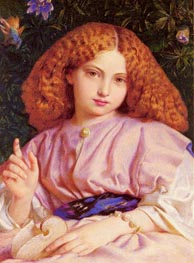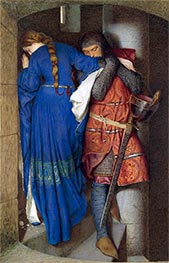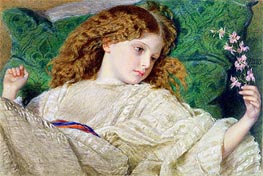
Frederick William Burton Painting Reproductions 1 of 1
1816-1900
Irish Pre-Raphaelite Painter
Frederic William Burton, born in Wicklow in 1816 and raised on Ireland’s west coast from childhood, experienced landscapes shaped by shifting light and layered histories. He came from a family that once occupied Clifden House in County Clare, a place marked by older traditions and local legacies. These formative years were hardly incidental, as those early impressions seemed to filter through his later work. By the time he reached adulthood, he had become an associate of the Royal Hibernian Academy, and soon after, an academician.
Yet Burton was not one to remain still, and his journeys across Europe - especially the sojourns in Germany and Bavaria - left him steeped in the study of earlier centuries’ masterpieces. Working for several years under the patronage of Maximilian II of Bavaria, he enriched his own understanding of form and color. He maintained ties to Ireland’s cultural life, sketching with George Petrie and engaging with archaeological societies. Such activities shaped a mind both reflective and outward-looking.
His watercolours from the mid-19th century capture human dramas that never quite settle into complacent silence. The poignant "The Aran Fisherman’s Drowned Child" from 1841 signals emotional complexity without overselling heartbreak, while "The Meeting on the Turret Stairs" - painted in 1864 - expresses private longing through a subtle interplay of gesture and gaze. This second piece, later hailed by the Irish public in 2012 as Ireland’s favorite painting, embodies Burton’s capacity for quiet storytelling in paint.
In 1874, when he became Director of the National Gallery in London, Burton carried that sense of thoughtful selection into the acquisitions he oversaw. His keen eye brought in Leonardo’s "Virgin of the Rocks" and Raphael’s "Ansidei Madonna," among many other treasures. He enriched the holdings with carefully chosen Old Master works, including those by Piero della Francesca, Botticelli, and Van Dyck. Over two decades, he shaped the Gallery’s character with clarity and discernment.
Later knighted and honored with a doctorate from Dublin, he embodied the best of an era’s artistic curiosity, neither bound by one school nor satisfied with fleeting trends. There was no heavy-handed flourish or shouty ambition; instead, he moved through his career with a certain grace, adding and adjusting, always intent on giving art its rightful place. When he died in London in 1900, and was laid to rest in Dublin, Burton left behind a legacy as painter, connoisseur, and curator - each role performed with an enduring sincerity.
Yet Burton was not one to remain still, and his journeys across Europe - especially the sojourns in Germany and Bavaria - left him steeped in the study of earlier centuries’ masterpieces. Working for several years under the patronage of Maximilian II of Bavaria, he enriched his own understanding of form and color. He maintained ties to Ireland’s cultural life, sketching with George Petrie and engaging with archaeological societies. Such activities shaped a mind both reflective and outward-looking.
His watercolours from the mid-19th century capture human dramas that never quite settle into complacent silence. The poignant "The Aran Fisherman’s Drowned Child" from 1841 signals emotional complexity without overselling heartbreak, while "The Meeting on the Turret Stairs" - painted in 1864 - expresses private longing through a subtle interplay of gesture and gaze. This second piece, later hailed by the Irish public in 2012 as Ireland’s favorite painting, embodies Burton’s capacity for quiet storytelling in paint.
In 1874, when he became Director of the National Gallery in London, Burton carried that sense of thoughtful selection into the acquisitions he oversaw. His keen eye brought in Leonardo’s "Virgin of the Rocks" and Raphael’s "Ansidei Madonna," among many other treasures. He enriched the holdings with carefully chosen Old Master works, including those by Piero della Francesca, Botticelli, and Van Dyck. Over two decades, he shaped the Gallery’s character with clarity and discernment.
Later knighted and honored with a doctorate from Dublin, he embodied the best of an era’s artistic curiosity, neither bound by one school nor satisfied with fleeting trends. There was no heavy-handed flourish or shouty ambition; instead, he moved through his career with a certain grace, adding and adjusting, always intent on giving art its rightful place. When he died in London in 1900, and was laid to rest in Dublin, Burton left behind a legacy as painter, connoisseur, and curator - each role performed with an enduring sincerity.
3 Frederick Burton Paintings

The Child Miranda 1864
Oil Painting
$1843
$1843
SKU: FWB-497
Frederick William Burton
Original Size: 37.5 x 27.3 cm
Private Collection
Frederick William Burton
Original Size: 37.5 x 27.3 cm
Private Collection

The Meeting on the Turret Stairs 1864
Oil Painting
$2780
$2780
Canvas Print
$56.36
$56.36
SKU: FWB-3111
Frederick William Burton
Original Size: 95.5 x 60.8 cm
National Gallery, Dublin, Ireland
Frederick William Burton
Original Size: 95.5 x 60.8 cm
National Gallery, Dublin, Ireland

Dreams c.1861
Oil Painting
$1755
$1755
Canvas Print
$56.36
$56.36
SKU: FWB-6571
Frederick William Burton
Original Size: 20.3 x 30.5 cm
Yale Center for British Art, Connecticut, USA
Frederick William Burton
Original Size: 20.3 x 30.5 cm
Yale Center for British Art, Connecticut, USA